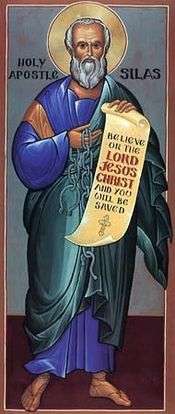Silas
Silas or Silvanus (/ˈsaɪləs/; Greek: Σίλας/Σιλουανός; fl. 1st century AD) was a leading member of the Early Christian community, who accompanied Paul the Apostle on parts of his first and second missionary journeys.[1]
Saint Silas | |
|---|---|
 | |
| Prophet, Disciple, Evangelist, Missionary, Bishop, & Martyr | |
| Died | 65 – 100 AD Macedonia |
| Venerated in | Roman Catholic Church, Eastern Catholic Churches, Eastern Orthodoxy, Oriental Orthodoxy, Anglicanism, and Lutheranism |
| Feast | January 26 (Evangelical Lutheran Church in America, Episcopal Church) February 10 (Lutheran Church–Missouri Synod) July 13 (Roman Martyrology) July 30 (Eastern Orthodoxy) July 13 (Syriac, Malankara Calendars) |
| Attributes | Christian Martyrdom |
Name and etymologies
Silas is traditionally assumed to be the Silvanus mentioned in four epistles. Some translations, including the New International Version, call him "Silas" in the epistles. Paul, Silas and Timothy are listed as co-authors of the two letters to the Thessalonians. The Second Epistle to the Corinthians mentions Silas as having preached with Paul and Timothy to the church in Corinth (1:19), and the First Epistle of Peter regards Silas as a "faithful brother" (5:12).
There is some disagreement over the proper form of his name: he is consistently called "Silas" in the Acts of the Apostles, but the Roman name Silvanus, which means "of the forest", is always used by Paul and in the First Epistle of Peter (5:12); it may be that "Silvanus" is the Romanized version of the original "Silas",[2] or that "Silas" is the Greek nickname for "Silvanus".[2] Silas is thus often identified with Silvanus of the Seventy. Catholic theologian Joseph Fitzmyer points out that Silas is the Greek version of the Aramaic "Seila" (שְׁאִילָא), a version of the Hebrew "Saul" (שָׁאוּל), which is attested in Palmyrene inscriptions.[3]
Biblical narrative
Silas is first mentioned in Acts 15:22, where he and Judas Barsabbas (known often as 'Judas') were selected by the church elders to return with Paul and Barnabas to Antioch following the Jerusalem Council. Silas and Judas are mentioned as being leaders among the brothers, prophets and encouraging speakers. Silas was selected by Paul to accompany him on his second mission after Paul and Barnabas split over an argument involving Mark's participation. It was during the second mission that he and Paul were imprisoned briefly in Philippi, where an earthquake broke their chains and opened the prison door. Silas is thus sometimes depicted in art carrying broken chains.[4] Acts 16:25-37.
According to Acts 17-18, Silas and Timothy travelled with Paul from Philippi to Thessalonica, where they were treated with hostility in the synagogues by some traditional Jews. The harassers followed the trio to Berea, threatening Paul's safety, and causing Paul to separate from Silas and Timothy. Paul travelled to Athens, and Silas and Timothy later joined him in Corinth.[5]
These events can be dated to around AD 50: the reference in Acts 18:12 to Proconsul Gallio helps ascertain this date (cf. Gallio inscription).[6] According to Acts 18:6-7, Paul ceased to attend the synagogue in Corinth as a result of Jewish hostility, Silas is not mentioned thereafter in the Acts narrative.
Veneration
Saint Silas is celebrated in the Calendar of Saints of the Evangelical Lutheran Church in America and that of the Episcopal Church (United States) on January 26 with Timothy and Titus, and separately on July 13 by the Roman Catholic Church and February 10 by the Lutheran Church–Missouri Synod. Saint Silas is also venerated by the Eastern Orthodox Church on July 30 along with the Apostles Silvanus, Crescens, Epenetus, and Andronicus and on January 4th where he is venerated with all the apostles.
See also
- Paul the Apostle
- Agabus
- Barnabas
- Manahen
- Teachings of Silvanus: an apocryphal text from the Nag Hammadi Library[7] that is attributed to Silvanus/Silas.
- Churches named after St Silas
References
- "Notes on 1 Peter". Archived from the original on 2015-10-03. Retrieved 2012-05-20.
- Dunn, James D. G., ed. (2003). The Cambridge Companion to St. Paul. Cambridge: Cambridge University Press. p. 21. ISBN 0-521-78155-8.
- Fitzmyer, Joseph J. (1998). The Anchor Bible: The Acts of the Apostles. New York: Doubleday. p. 564. ISBN 0-385-49020-8.
- The Holy Disciples from the Seventy
- Acts 18:5
- Cross, F. L.; Livingstone, E. A., eds. (2005). The Oxford Dictionary of the Christian Church (3rd Revised ed.). Oxford: Oxford University Press. pp. 1243–5. ISBN 978-0-19-280290-3.
- "Nag Hammadi Library". gnosis.org. Retrieved 2019-03-25.